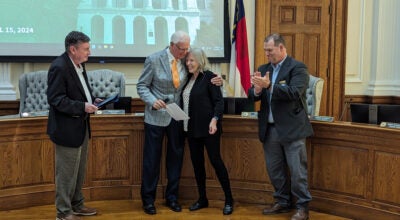More than 50 new laws in NC include abortion, guns
Published 12:00 am Monday, September 30, 2013
RALEIGH (AP) — North Carolina concealed weapon permit holders will have more leeway to bring their handguns into bars and restaurants and onto school and university property starting Tuesday as all or portions of more than 50 laws approved earlier this year are carried out.
Other new laws set for Oct. 1 enactment by the General Assembly will place additional rules on abortions, require new consumer protections when they’re billed by hospitals and doctors, and demand higher fees for boat licensing.
As far as the gun amendments, people with concealed handgun permits will be able to arm themselves in a restaurant where alcohol is served, provided they don’t drink or enter an establishment that has a sign to prohibit weapons.
Permit holders also will be allowed to store their handguns in a closed compartment in a locked car at parking lots owned or leased by state government or at lots in any school from kindergarten through college.
Gun rights advocates within the General Assembly and outside say Tuesday’s changes, which also include longer punishments for people who use or display guns while committing felonies, will deter violent crime, not augment it as critics contend.
“We expect to see exactly what’s happened in other states — nothing, absolutely nothing,” said Paul Valone, leader of Grass Rights North Carolina, which sought the eased concealed weapon restrictions. “Concealed-carry weapon holders have always been responsible.”
Private colleges and boarding schools can more narrowly limit who can have guns and where, but public schools and UNC system schools can’t. Police chiefs on the system’s 17 campuses, who unsuccessfully sought to remove universities from the list of new places where weapons can be stored in the final bill, are worried about the new law.
Although permit holders must be at least 21 years old, the law creates more potential for accidental shootings and suicide attempts, UNC-Chapel Hill Police Chief Jeff McCracken said Monday. It also may encourage violence against others, he said.
“People who are ordinarily law-abiding folks who are doing what the new law says may take action to address a dangerous situation on campus and thereby putting themselves and others in jeopardy,” he said.
Valone said his organization is assembling an online list of what it calls “high-risk” restaurants posting signs and refusing to allow permit holders to enter with their concealed weapon. Grass Roots NC will encourage its members to boycott those establishments.
The new abortion law, like the gun law signed by Gov. Pat McCrory in the summer, makes it illegal starting Tuesday to carry out abortions on the basis of the baby’s gender and limits abortion coverage in insurance plans offered by cities and counties to case involving rape, incest or danger to the mother’s life.
Doctors performing surgical abortions must be physically present for the entire procedure and in the same room when a patient receives the first drug for a chemically induced abortion.
Abortion-rights groups are most displeased with a portion of the law that won’t occur Tuesday — a requirement that abortion clinics be regulated using similar standards as those for outpatient surgical centers. Those rules still have to be developed by the state Department of Health and Human Services.
Portions of another new law are designed to help patients and their families wade through medical bills. Hospitals and surgery centers must provide, when asked, itemized billing statements “in language comprehensible to an ordinary layperson.” They would be unable in some situations to place a lien on someone’s house to collect unpaid bills, and certain public hospitals would be barred from garnishing wages for similar debt.
Owners of boats also now have to pay higher one- or three-year fees to obtain their vessel’s license number and higher new and transfer title fees. A large portion of the revenues will be transferred to a new dedicated fund to pay for dredging shallow navigation channels and lakes. The fund was developed as the federal government is moving away from paying for dredging projects.




